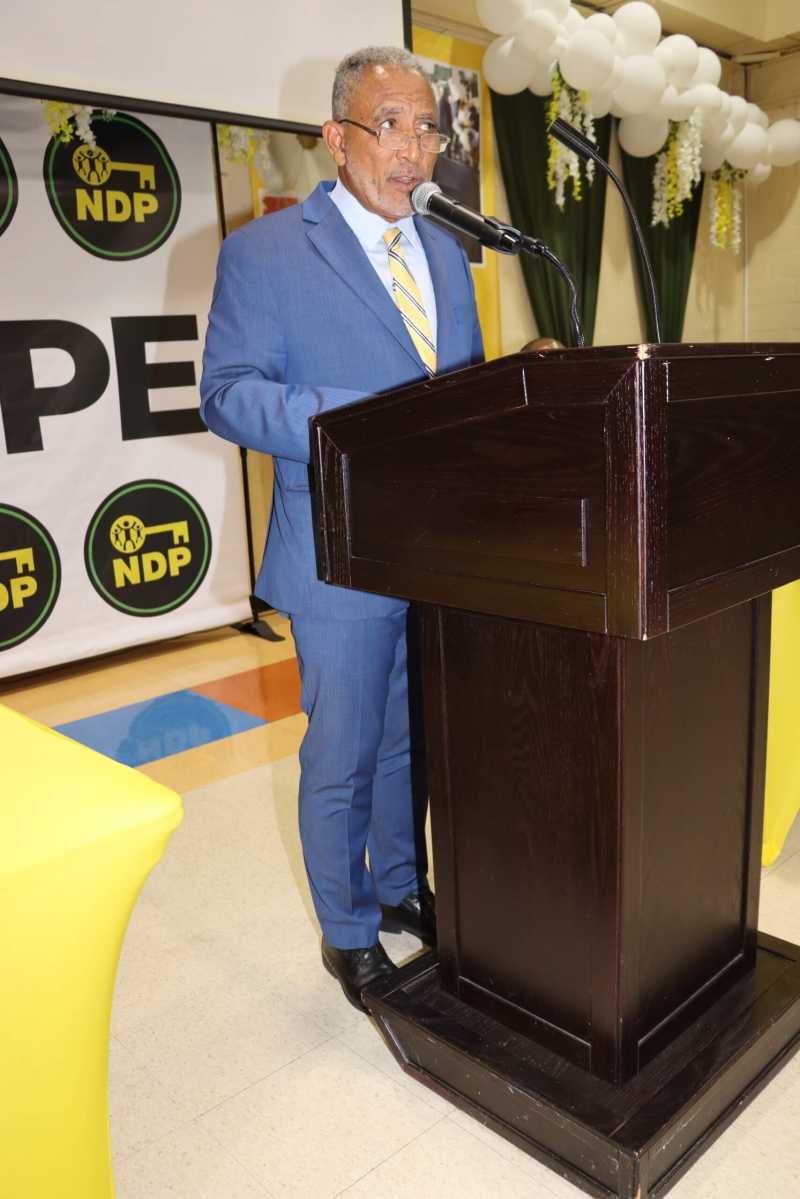In painting a very bleak picture of the socio-economic situation in St. Vincent and the Grenadines, Opposition Leader Dr. Godwin Friday claims the country is “headed in the wrong direction” under the Unity Labor Party (ULP) leadership of Prime Minister Dr. Ralph E. Gonsalves.
“St. Vincent and the Grenadines is a wonderful country. We all know that. However, we are headed in the wrong direction,” said Dr. Friday, president of the main opposition New Democratic Party (NDP), in addressing a town hall meeting Sunday night at the Friends of Crown Heights Educational Center, 671 Prospect Pl., Brooklyn.
“Higher unemployment than in earlier years is our reality,” added Friday on the party’s “New Hope for Home New York Tour,” flanked by Sen. Shevern John, candidate for North Windward; Lavern Velox, candidate for East St. George; and NDP Public Relations Officer Lavern King, who hails from the Southern Grenadines island of Canouan. They also addressed the town hall.
Daniel Cummings, NDP chairman and Parliamentary Representative for West Kingstown, was slated to address the meeting but was unable to make the tour, according to Stephen “Scombo” John, president of the Brooklyn-based St. Vincent and the Grenadines Progressive Organization of New York (SPOONY), the New York arm of the NDP, which hosted the event.
The NDP team is expected to conduct a similar tour of Canada this weekend, John said.
In his one and a half-hour address, Friday told the New York tour that more than 20 percent of the workforce in St. Vincent and the Grenadines do not have jobs, and that the current unemployment situation was among the highest in the sub-regional Organization of Eastern Caribbean States (OECS).
“And it is much worse for young people, who, too often, are forced to leave St. Vincent and the Grenadines to find work abroad,” he said. “For those who have a job, low and stagnant wages offer little hope that they can build a future and improve the quality of their lives.”
The Opposition Leader said crime in the multi-island state has spiralled out of control, causing fear and frustration among nationals, “and, at times, touching those close to us.”
He said the healthcare system in St. Vincent and the Grenadines was in “a state of disrepair,” adding that it was “broken down so much that many of our people are afraid to use it and do not trust it.”
Friday, the parliamentary representative for the Northern Grenadines, said the roads were also in “bad shape and have become obstacle courses.”
He said, despite promises at the last election, the Gonsalves-led ULP government had “failed to make any real progress on delivering jobs, improving wages, or tackling crime.
“And they presently lack energy and initiative, so that their new promises are not believable and should not be believed,” he said. “Over two decades of power has given rise to complacency and arrogance, and they are no longer in touch with the real needs and concerns of the ordinary people. They have simply been there too long.
“We cannot afford to stall anymore or to drift any further, which is what another term of ULP government would bring,” warned Friday, stating that the NDP had set out five priorities for a “brighter future” in St. Vincent and the Grenadines.
He identified them as creating more and better paying jobs; rebuilding an economy that provides opportunity for all; making communities and the country, as a whole, safe from crime; ensuring reliable and affordable healthcare “we can trust”; and improving roads and general infrastructure.
The NDP president said no country can progress unless it had a growing economy.
“We can only beg and borrow so much; then we must produce and earn for ourselves to improve our living standards,” he said. “But it does not happen on its own; there must be a plan to guide how we do it.”
He said the NDP has, therefore, committed to building prosperity for St. Vincent and the Grenadines on four pillars: Agriculture, tourism, blue economy (primarily fishing, boat repair and boat building), and new economy.
“You in the Diaspora can help by investing in St. Vincent and the Grenadines,” Friday urged. “We will encourage that and give special administrative support to facilitate your investment in St. Vincent and the Grenadines.”
In discussing specific issues confronting the nation, he said the rising cost of living is a “serious problem”, claiming that food prices, fuel prices and electricity costs have “all gone all up, some by a lot.”
He said that while governments across the OECS and the wider Caribbean have cut fuel taxes, reduced import charges, controlled the prices of basic goods, increased direct supports to those most in need and capped the fuel surcharge to help with electricity bills, these are “not so in St. Vincent and the Grenadines.”
Friday said the NDP had a plan to immediately help to ease the effects of rising cost of living by reducing the Value-Added Tax (VAT) from 16 percent to 13 percent and ensuring that the savings are passed on to ordinary consumers; increasing the number of zero-rated VAT items that will reduce grocery bills for everyone; repealing the Customs Service Charge increase that was raised from 5 percent to 6 percent to reduce import costs; and increasing support for lower income families by expanding existing support programs and ensuring that the support is distributed based on need and not by political favour.
In addition, the Vincentian opposition leader said the NDP plans to provide import duty concessions for the transportation industry, namely minivans, buses and taxis, and end the “unlimited increase” in the St. Vincent and the Grenadines Electricity Services (Vinlec) bill by putting a cap on the fuel surcharge and by improving efficiency.
“These measures are practical and realistic, and can deliver benefit to everyone immediately,” he said. “In the medium term, growing the economy and creating good jobs will enable people to meet their living expenses.”
Friday cautioned that the National Insurance Service (NIS) was “in trouble,” saying that this was “no exaggeration.”



























